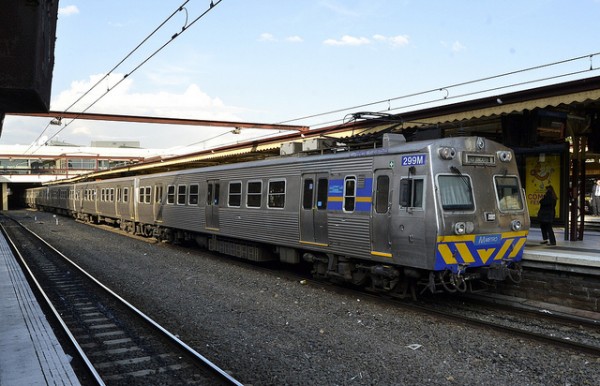
Last night’s Melbourne Transport Super Forum featuring Minister Terry Mulden, the ALP’s Jill Hennessy and the Green’s Greg Barber was as packed as a Melbourne train with policy wonks and advocates.
The presentations were dominated by the usual point scoring. But there was some good news for those looking for the sensible financing of public transport. The last MTF event had all five speakers discuss the need for innovative financing via Value Capture.
Minister Terry Mulden rattled off the standard performance statistics that more trains were on time, less trains were filled over capacity, less were cancelled and customer satisfaction was on the rise from 2010. He set a post election goal of 95% punctuality for trains and trams – to groans from the audience – another broken promise coming.
He pledged more funding of transport frequency, free CBD trams, same fees for zone 1 and 2 etc., but no mention of where the finding was to come from.
In summary, Mulden gave fairly uninspiring remarks about the performance and targets of the Coalition, and how Labor hasn’t and wouldn’t deliver on transport promises. Where was the vision the improved system was to achieve?
Jill Hennessy spoke next and jumped straight into the ALP rhetoric – ‘the minister doesn’t understand that in my constituency, poorer voters miss trains, cant get kids to school, lose jobs, spend a lot on petrol, live far away from public transport, public transport is poor so they cant commute.’
She criticised the coalition’s focus on roads and the east-west link, the abandonment of many projects and modification of Melbourne Metro Rail with Melbourne Rail Link, removing several of the new stations, new city loop tracks, and new lines.
Further criticism of the coalition projects (East-West and Melbourne rail link) included as being contrary to expert advice. The Liberals promised several lines (Rowville, Doncaster, Avalon) and didn’t deliver – not a transport government.
Many of the policies in the Transport 10,000 document were checked off the list. At least the ALP have a transport policy document online.
The Greens Greg Barber finished the panel. His big statement was that the Greens have a broad vision that other parties have drawn from in policymaking. Thats interesting considering what they have online. His other big play was asking members of the audience to raise their hand if in favor of the East-West link. No one did.
The Victorian Auditor General’s reports were quoted about the poor coordination of public transport – and pointed out the infrastructure fund drawn from communities (GAIC), that only the roads fund was spent by the government, not the PT fund.
Question Time
Many of the questions were about specific projects for growth areas.
Jill Hennessy also spoke about the revenues collected by the Growth Areas Infrastructure Fund, that the transport section of this hasn’t been spent, only the roads portion, reflecting the government’s priorities.
She then spoke on Value Capture in regards to statements by Terry Mulden on the dangers of overcommitting in regards to level crossing removal. Jill promoted Value Capture to offset the costs of 50 level crossing removals, using and implementing value capture in consultation with communities to reinvest into transport.
We support such a policy stance wholeheartedly. It is the fairest and most efficient way of financing infrastructure.
Greg Barber spoke on value capture regarding the Box Hill roads infrastructure, where value was captured by developers. Exactly! The VAGO found money was wasted by not capturing value.
Barber rightly said Value Capture had to be done with good urban planning systems and good urban planning outcomes –and so dependant on urban planning for effectiveness. Money taken from value capture in level crossings should be used to provide more services on those lines, more train services, to provide tangible benefits to those who contributed through value capture
Concluding remarks
Barber : ‘we needed more money to deliver a better city’.
Hennessy: ‘the number one priority of the ALP is the rail link, level crossing removal, and funding for new forms of PT.’
Mulden: concluded with PSOs, safety, satisfaction improvements, frequency improvements, the importance of departments working together, a collective government approach to transport which has created less ambiguity in the system, the importance of PTV as new statutory authority, administrative rationalization and increased correspondence
Well done to the Melbourne Transport Forum for putting on the event. We will be interested to see this policy differentiation play out over the coming election cycle.


